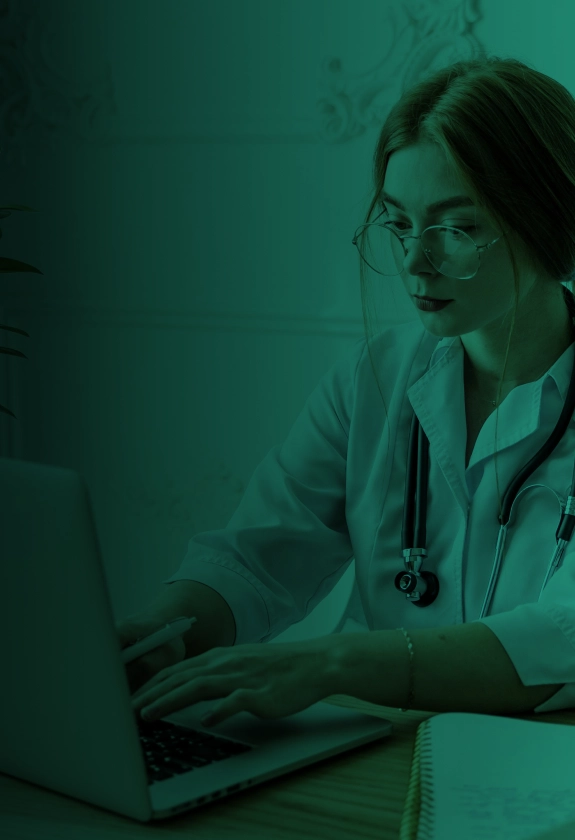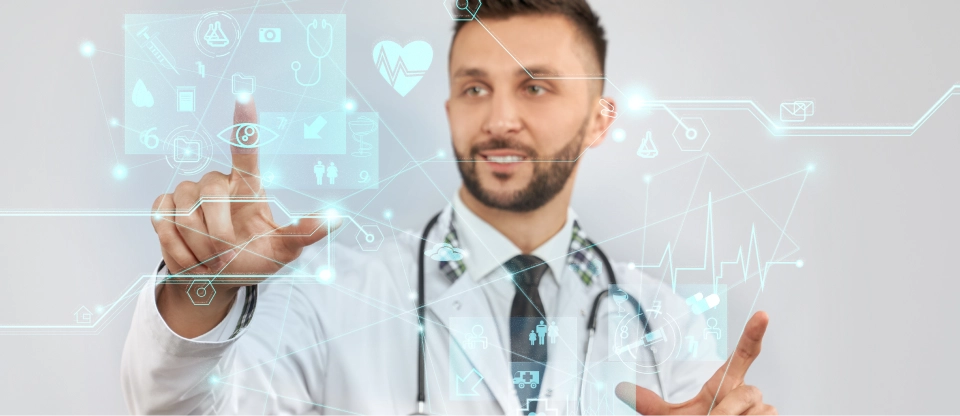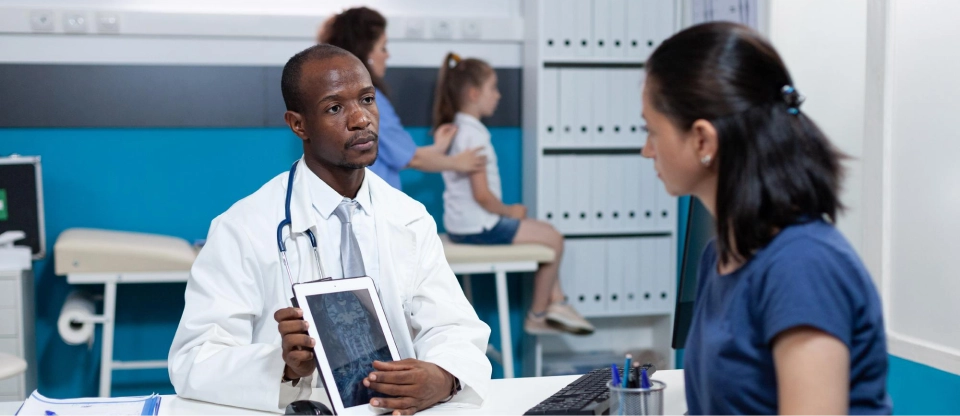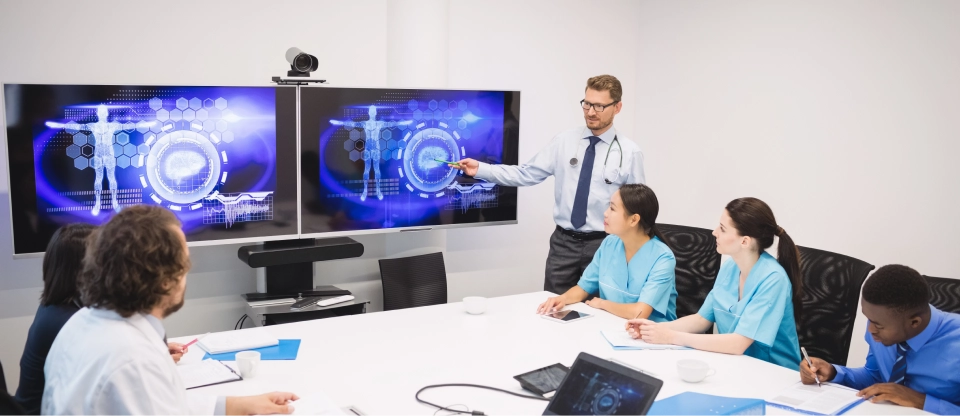INTRODUCTION
Navigating the landscape of tech-driven healthcare
In healthcare, technological advancements have catalyzed a seismic shift in the delivery of medical services. Technology permeates every facet of healthcare, from consulting with doctors to managing personal health data, ushering in a new era of innovation and transformation. This convergence of technology and healthcare has expanded horizons and significantly improved patient outcomes on a global scale. Today, the healthcare landscape is witnessing unprecedented advancements that were once confined to the realm of imagination. From robotic surgery to virtual consultations and AI diagnostic tools to wearable devices, technology is undeniably reshaping the contours of modern medicine.
The upsurge of digital innovation in healthcare has yielded profound benefits, particularly in disease prevention. By harnessing the power of technology, healthcare organizations can now detect diseases at their nascent stages, thereby saving lives and expediting treatment processes. Yet, amidst these remarkable achievements, a vast terrain of untapped potential remains awaiting exploration. The transformative possibilities offered by technology in healthcare are boundless, promising to revolutionize how medical care is delivered and received globally. Hence, it becomes imperative to chart the trajectory of these tech-driven ideas, as they hold the key to shaping the future of healthcare for generations to come.
OVERVIEW
Diving into the transformative potential of tech-driven ideas
In the ongoing narrative of healthcare evolution, technology emerges as a beacon of hope, transforming the sector from a mere service into a realm of boundless possibilities. The integration of technology into healthcare is not merely about innovation; it's about enhancing the quality of care delivered by medical professionals to patients. Undoubtedly, there exists compelling evidence that tech-driven healthcare solutions perform tasks on par with, if not better than, humans. For instance, ML and AI algorithms have revolutionized medical imaging interpretation, eliminating human error and expediting accurate diagnoses.
The healthcare sector is forging a path toward a more efficient, accessible, and high-quality landscape of care for patients worldwide. Each technological advancement, whether telemedicine, robotics, blockchain, or AI, has the potential to redefine healthcare delivery, enhance patient outcomes, and streamline administrative processes. By combining technological innovations with the human touch, healthcare professionals can mitigate errors, make informed decisions, and save lives through timely diagnoses and precision treatments.
The role of technology in modern healthcare
In the era of the digital revolution, every tech-driven idea represents a phoenix rising from the ashes, heralding a new dawn of limitless possibilities and reshaping our interaction with technology. From telemedicine to AI diagnostics, each technological innovation promises to transform healthcare delivery, improve patient outcomes, and optimize operational efficiency. By integrating technology into healthcare, we enhance precision and effectiveness in treatment and mitigate the risk of human errors, ensuring that every medical decision is informed and optimized for patient well-being.
A recent Microsoft-IDC study conducted in March 2024 suggests that the percentage of healthcare organizations using AI technology is staggering and stands presently at 79%.
Importance of software development in improving patient care and operational efficiency
Central to integrating technology into modern healthcare systems is the development of custom healthcare software solutions. These software platforms serve as the convergence point between healthcare and technology, enabling innovation and efficiency in medical practice. Whether it's a comprehensive enterprise-wide platform for large healthcare organizations or a specialized electronic health record (EHR) system for standalone clinics, custom software solutions cater to the unique needs of each healthcare entity. Software development is pivotal in driving operational efficiency and delivering quality healthcare services by streamlining workflows, centralizing data management, and enhancing patient care.
We implement revolutionary ideas to harness the power of emerging technological trends in healthcare.
KEY TECH TRENDS
Discussing the latest technological trends reshaping healthcare IT solutions
Technological advancements continually reshape the healthcare landscape, paving the way for transformative innovations that redefine patient care and medical practice. From the unprecedented rise of telemedicine to the integration of blockchain technology, the healthcare ecosystem is witnessing a paradigm shift propelled by cutting-edge tech-driven ideas. This section explores vital technological trends revolutionizing healthcare IT solutions, driving efficiency, accessibility, and quality of care.
AI and machine learning applications in diagnostics and treatment
AI and machine learning have permeated nearly every aspect of modern life, and their application in healthcare is no exception. Snapchat knows how to personalize your content feed and suggest filters that you would like. Netflix employs AI algorithms to recommend movies and TV shows that you would bingewatch. Siri and Amazon Alexa prepare a suitable response that aligns maximally with your query. Similarly, AI and machine learning can help a great deal in identifying your preferences and predicting case-specific healthcare trends.
These technologies have become indispensable tools in predicting healthcare trends, enhancing diagnostic accuracy, and optimizing treatment protocols. By uncovering subtle patterns and correlations within patient data, AI algorithms mitigate errors and expedite accurate diagnoses, ultimately improving patient outcomes.
According to a report by Grand View Research, the global AI market in healthcare is projected to grow at a CAGR of 38.5% within seven years from 2024 to 2030.
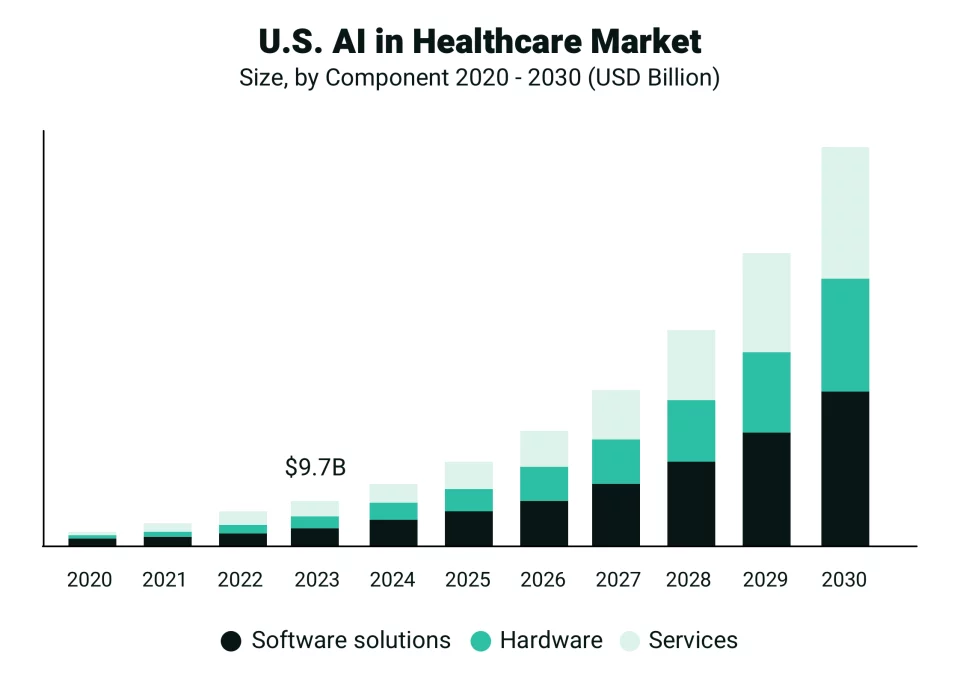
The exponential growth in healthcare data presents significant opportunities for AI-driven solutions
AI has enormous potential in the healthcare industry, and it will continue to dominate the space with acceleration in the future. Notable examples of AI applications include IBM Watson for oncology, VisualDx for dermatological treatments, and Aidoc for radiology solutions.
Telemedicine and remote patient monitoring
The advent of telemedicine has transcended geographical barriers, offering unprecedented access to healthcare consultations through virtual platforms. This evolution, accelerated by the COVID-19 pandemic, has revolutionized healthcare delivery by enabling real-time interaction between patients and providers from any location. Telemedicine integration ensures convenience and timeliness and empowers patients to take an active role in managing their health through remote patient monitoring best practices. By leveraging smartwatches, mobile health apps, and other wearable devices, patients can access medical data, detect early signs of health changes, and seek timely interventions, thus facilitating continuous care and improved health outcomes.
Here are a few examples of telemedicine apps that facilitate remote patient monitoring:
- CareSignal
- 1Health
- Amwell
- Teladoc
Blockchain for secure health data management
Blockchain technology emerges as a cornerstone of innovation in healthcare IT solutions, offering a secure and decentralized approach to data management. Blockchain addresses critical challenges in health data security by ensuring tamper-proof data integrity and safeguarding patient privacy. Custom electronic health record (EHR) solutions built on blockchain platforms uphold the integrity of patients' health profiles, facilitating seamless data exchange and enhancing interoperability across healthcare organizations. Moreover, blockchain fosters greater transparency and patient-centricity by giving individuals control over their medical data, instilling trust and confidence in the healthcare ecosystem.
Robotics and automation for enhanced precision
Robotics and IoT automation technologies are revolutionizing healthcare delivery by enhancing precision, reducing errors, and optimizing workflows. While surgical robotics enable minimally invasive procedures with reduced complications and shorter recovery times, automation systems streamline medication management and dispensing processes, ensuring safe and efficient patient care. Although relatively nascent in the healthcare sector, these technologies hold immense potential to drive medical advancements and elevate the standard of care. With their unparalleled precision and accuracy, robotics and automation are poised to reshape the future of healthcare, optimizing outcomes and enhancing patient experiences.
IMPACT
Software development is facilitating efficiency to improve patient outcomes
Within the progressive framework of modern healthcare, the convergence of patient needs, regulatory requirements, and technological advancements is undeniable. Here, software development emerges as a vital catalyst for progress, driving efficiency to enhance patient outcomes.
A proficient healthcare software development company comprehends your unique requirements and steers your project from inception to execution seamlessly. By adeptly managing and organizing patient data, such companies empower healthcare staff to access critical medical information anytime, anywhere.
Furthermore, entrusting your healthcare software development to capable hands ensures skilled navigation through industry standards, stringent security protocols, and the dynamic realm of healthcare regulations. This diligent approach guarantees the resilience and relevance of your software, aligning it with the latest practices in the ever-evolving healthcare ecosystem.
Case study illustrating successful software implementations in healthcare settings
Asahi Technologies stands out as a beacon of success in healthcare software development, consistently delivering tailored solutions to advance medical innovation across diverse platforms. Through a meticulous understanding of each client's unique requirements, we have spearheaded numerous successful implementations, revolutionizing operational efficiency in healthcare settings. Let's delve into a compelling case study showcasing their prowess.
Asset inventory management solution for a children’s hospital in America
Tasked with optimizing operations and eradicating the inefficiencies of manual paperwork riddled with errors, we developed and implemented an asset inventory management process for a leading children's hospital in America. HealthOps, the hospital's equipment vendor, sought a streamlined approach to manage logistical processes effectively.
Upon receiving the brief detailing the challenges the existing manual asset management system posed, we swiftly devised an agile and automated solution to enhance operational efficiency. Here's a breakdown of their approach:
- Development of a unified process - We crafted a comprehensive system integrating equipment order fulfillment and asset management into a single unified process.
- Role-based access control - The solution provided role-based access and control, ensuring security and confidentiality in system operations.
- Automation and optimization - Core business processes were automated, streamlined, and optimized to eliminate redundancy and enhance productivity.
- Agile and scalable solution - We engineered a flexible and scalable solution to accommodate future growth and adapt to evolving healthcare needs.
As a testament to our expertise, we developed two web-based and mobile applications tailored to the client's requirements. This innovative solution empowered users with real-time visibility into order fulfillment, asset inventory, and asset requests, eliminating the need for manual data entry and paperwork. The seamless integration of web-based and mobile applications facilitated swift and accurate operational processes, while robust reporting capabilities provided valuable insights for informed decision-making.
In conclusion, our custom healthcare solution addressed the client's immediate challenges and positioned them for sustained success in the dynamic healthcare landscape.
Role of custom software solutions in addressing specific healthcare challenges
There is no one-size-fits-all policy in the world of healthcare. Every organization is unique and has different goals. The primary objective of some may be to improve patient outcomes while for others it may be to focus on optimizing operational efficiency. Here, custom healthcare software development services come into play and undertake a crucial task to tackle specific healthcare needs and challenges, unique to every company. Whether an organization wants a specialized mental health EHR software developed or whether an organization needs to implement patient engagement platforms, custom software developers get going in response to a client’s specific needs.
Custom healthcare software developers are pivotal in crafting solutions tailored to diverse requirements. Whether developing specialized electronic health record (EHR) systems or implementing patient engagement platforms, these developers efficiently respond to client demands.
The scope of custom healthcare solutions is vast, encompassing a range of services such as:
- Mobile health app development
- Hospital asset inventory management solutions
- Operations management tools
- Pharmacy management systems
Beyond these examples, custom software solutions extend to address various other healthcare challenges. Essentially, they serve as indispensable tools for navigating the intricacies of healthcare management.
Partnering with experienced healthcare software developers enables organizations to harness technology to optimize operations and enhance care delivery. By leveraging custom solutions, healthcare entities can adapt to evolving demands and stay at the forefront of industry innovation.
Our solutions can unlock the boundless possibilities of tech-driven ideas that can shape the future of your healthcare business.
CHALLENGES AND OPPORTUNITIES
Explore the challenges in the tech-driven healthcare world to unlock opportunities
In modern healthcare, a dual narrative of challenges and opportunities emerges, akin to the two sides of a coin. While innovations such as AI hold immense promise, they can never supplant the human touch in healthcare; instead, they augment healthcare professionals' capabilities, acting as supportive tools within the ecosystem. However, the complexity of AI presents challenges, including the potential for unintended consequences and misuse.
As technology continues to advance, concerns over data breaches and cyber threats loom large. In an increasingly patient-centric healthcare environment, ensuring the security and privacy of individuals' data becomes paramount.
Regulatory hurdles and compliance issues
Navigating regulatory hurdles and compliance issues is an intrinsic aspect of the healthcare industry. While these regulations, enforced by law and authorities, are designed to ensure patient safety and uphold standards of quality healthcare delivery, they also present challenges for adopting new technologies. The rapid pace of technological advancements often outstrips the development of regulatory frameworks, leading to ambiguity for healthcare software developers and organizations.
One significant challenge in this landscape is compliance with HIPAA (Health Insurance Portability and Accountability Act) and GDPR (General Data Protection Regulation), which govern the handling and protection of sensitive health data. Ensuring adherence to these regulations is essential, particularly in the face of increasing digitization of medical records.
Maintaining robust data security measures is imperative to safeguard against data breaches and leaks. Healthcare organizations must adhere to strict data protection protocols to uphold patient privacy and regulatory compliance. Partnering with an experienced healthcare app development company can provide valuable expertise in navigating these challenges, mitigating the risks of costly breaches and regulatory penalties.
Emerging opportunities for software developers in healthcare
Software developers play a pivotal role in driving innovation and shaping the future of patient care. Leveraging their technical expertise and creative prowess, they develop tailored solutions to address the unique needs of every healthcare organization. With their transformative capabilities, software developers serve as catalysts for integrating technology into the healthcare ecosystem, bridging the gap between technological advancements and enhanced healthcare delivery.
At the forefront of the healthcare industry, software developers are presented with a myriad of opportunities to make a significant impact in critical areas such as:
- Healthcare data analytics
- Telemedicine platforms
- Mobile health (mHealth) applications
- Blockchain technology in healthcare
- AI healthcare solutions
- Remote patient monitoring platforms
- Electronic health records (EHR)
By harnessing their skills and innovation, software developers drive improvements in patient outcomes and contribute to the advancement of healthcare on a global scale. Their contributions are vital in shaping a more efficient, accessible, and patient-centric healthcare system for the future.
FUTURE PREDICTIONS
Tech-driven healthcare is poised for remarkable advancements
The trajectory of technological innovation in healthcare shows no signs of slowing down. From its presence in the past to its omnipresence today, technology continues to be a driving force reshaping the healthcare landscape. With ongoing technological advancements, the evolution of the industry would continue. Just as healthcare systems swiftly adapted to the challenges of the COVID-19 pandemic with technological tools, they will rely on technology to navigate future challenges and seize opportunities.
Forecasting upcoming trends and innovations in healthcare technology
Predicting the future of healthcare technology is a complex task, as it involves a convergence of technological advancements, societal needs, education, and acceptance. However, certain trends are already shaping the landscape. Telemedicine, for instance, has transcended geographical barriers, enabling virtual consultations and improving access to healthcare. AI-driven solutions are optimizing patient care by enhancing diagnostic accuracy and treatment efficacy.
Moreover, precision medicine is revolutionizing healthcare by tailoring treatments to individual characteristics such as genetics and lifestyle. This approach aims to offer personalized treatment strategies based on genomic sequencing and data analytics. Blockchain technology, though still in its infancy in healthcare, holds promise for fortifying data security and transparency.
As these tech-driven trends continue to evolve, stakeholders in the healthcare industry must remain proactive in harnessing emerging technologies to address challenges and enhance patient care.
The potential impact of emerging technologies like IoT and wearables
Emerging technologies like wearables and the Internet of Medical Things (IoMT) are poised to transform healthcare. Wearables, integral to the future of precision medicine, gather vital health data and offer insights into patients' well-being. Machine learning algorithms analyze this data to predict health trends and provide personalized treatment advice. With wearable devices becoming increasingly accessible, individuals can take control of their health and engage in proactive disease prevention.
IoMT-enabled devices facilitate seamless data exchange among healthcare stakeholders, enhancing patient care coordination and interdisciplinary collaboration. This shift towards preventive healthcare underscores the importance of continuous monitoring and early intervention.
Ready to undergo a digital transformation with the latest tech trends?
FINAL WORD
Summing up the tech-driven ideas that continue to revolutionize the healthcare space
The healthcare industry stands at the forefront of a continuous technological revolution. As long as humanity exists, the evolution of tech-driven ideas in healthcare will persist. Today's innovators are realizing dreams of the past, while tomorrow's dreams will be brought to fruition with even greater precision and accuracy. Innovators and software developers tirelessly seek to apply new technologies to improve healthcare outcomes and experiences.
The proliferation of digital health services will continue to redefine the healthcare industry, with custom healthcare solutions emerging as the cornerstone of future healthcare technology. In this evolving landscape, healthcare strategy consulting will become the norm, guiding organizations toward innovative and effective healthcare solutions. For those seeking sound, technologically driven ideas to enhance healthcare delivery and diagnostics, Asahi Technologies offers comprehensive healthcare IT solutions perfectly tailored to fit seamlessly into any healthcare ecosystem.
Most common people also ask (PAA) questions:
- What are the latest trends in healthcare technology?
The most talked-about tech-driven trends in the healthcare sector include AI and machine learning for treatment optimization, telemedicine for virtual consultations, IoT and wearables for constant health monitoring, blockchain technology for secure data management, and robotic surgery assistance. - How is software development improving patient outcomes?
Software development enhances patient outcomes by streamlining data management, providing clinical decision support, enabling remote monitoring and telemedicine, fostering patient engagement, and facilitating healthcare analytics. These advancements lead to more informed decision-making, timely interventions, and improved access to care, ultimately resulting in better patient health outcomes. - What are the challenges of implementing technology in healthcare?
Implementing technology in healthcare invites a host of regulatory and compliance hurdles centered on data protection and privacy. The rate at which technology develops remains unmatched by the rate at which regulations are changed to accommodate innovations and advancements. - Which technologies are revolutionizing healthcare delivery?
Telemedicine is at the forefront of the technological revolution in healthcare delivery. It enables remote consultations and extends healthcare services despite geographical barriers. Other technologies, such as AI, robotics, IoT, wearables, and machine learning, are also transforming healthcare delivery. - What role does AI play in modern healthcare?
AI plays a crucial role in modern healthcare. It analyzes vast amounts of medical data to identify patterns and trends that can contribute to improved treatment planning, diagnostics, and patient care. Moreover, AI-powered tools help improve efficiency by streamlining administrative and operational tasks.
Step into a future of personalized medicine, preventive care, and interconnected ecosystems with our innovative solutions.
